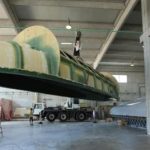Yet another highly encouraging story of Croatian innovation and creativity surfaces in the form of young Croat Robert Basic and his guitars from Samobor.
As Poslovni Dnevnik/Tomislav Pili writes on the 7th of February, 2020, Robert Basic is completely self-taught, and at the age of just sixteen, he became a talented craftsman. Twelve years later and after making eighty unique guitars, this fascinating young man has a workshop in his family house in Galgovo in Samobor, and some of the most famous Croatian bands, such as Prljavo Kazaliste, Kawasaki 3p and Hladno pivo play instruments made by him.
Basic was born in 1991, and after finishing school, he enrolled in the Faculty of Electrical Engineering and Computing (FER) in Zagreb. However, the study whose diploma almost completely guarantees a successful career saw Basic leave after only one semester. The reason for that was his decision to go into the world of the production of electric guitars. In December 2011, at just twenty years of age, he opened a company called R. Basic-Sound control (Kontrola zvuka).
Croatian innovation often has very humble beginnings, and the roots of Basic’s story is no different. He found his motive for the construction of stringed instruments – which is an almost extinct craft that only about ten people in Croatia are professionally involved in – in his love of music.
He was first introduced to the world by his father and started playing instruments himself at the age of nine. His dad, Mladen, plays the keyboard, and Robert tried to play drums and guitar in addition to that instrument. However, he liked the guitar the most. With the Pipsqueak cover band, he debuted on stage back in 2007.
At one such gig nine years ago, his acquaintances offered for him to join them in establishing a band playing a somewhat unusual type of music in Croatia – country music. He then became Country Strike’s guitarist and they’ve already released a five-song EP and are now working on their first album. They have performed twice in Jefferson, Texas, at the ”Texas Sound International Country Music Awards”. It is an international festival featuring thirty music bands from fifteen countries, and Basic’s band won the main prize twice.
Despite this, playing alone is still difficult to make any sort of living from.
“You can make a living from music only if you do that exclusively, if you like the audience, if you manage to charge for it, and if someone pushes you,” Basic says.
Instead, he decided to focus on making guitars, which he started doing at the beginning of high school when he saw on an online forum that there were people who make guitars themselves who play in their own bands.
“I made my first guitar with borrowed tools,” Basic recalls. Seeing this, his parents got him some more tools. But back then, he considered making guitars to be just a hobby, with no idea that one day it would grow into a serious business. But he sold the second guitar he made to a friend and bought more tools from the money he made. The rumours of a young man making top quality guitars in Galgovo quickly began to spread.
Four years later, inquiries for guitar making and servicing were coming to him from all directions. At that time, Basic had become a FER freshman, but soon realised that he wasn’t particularly interested in his studies.
“I thought like this – if I open a business and let’s say in three years I realise that work isn’t going well, then I’ll continue my studies. After eight years, I’d have a degree and three years of service. But I had to convince my parents a little more that it was the right decision.” Basic points out. At the beginning of his adventure, he made about ten guitars a year, and he has maintained that momentum to this day. Anyone who wants a guitar from him must first know what they want, especially in terms of the form.
“I can suggest to buyers what kind of wood would suit them, given the music they play,” Basic emphasises.
The question of choosing a tree isn’t irrelevant. As Basic explains, the biggest difference between his guitars and those established manufacturers like Fender is the quality of the material – wood.
“Big manufacturers are aiming for as much material utilisation as possible. I’m left with the waste of three more guitars because not every part of the wood is good and suitable for making instruments. In addition, quality control on a series of thousands of guitars cannot be at the same level as with me making one guitar in a month,” explains Basic. In the construction of the guitar, he uses all kinds of wood which is standard in the making of this instrument – maple, ash, alder and mahogany. The sound of the guitar depends on the choice of wood, emphasises this craftsman.
Basic’s guitars sound great, as confirmed by the bands from the domestic rock scene who put this piece of Croatian innovation to good use – Prljavo Kazaliste, Kawasaki 3p, Kojoti, Hladno pivo, Vatra and Urban&4.
Make sure to follow our dedicated Made in Croatia page for more on Croatian innovation.









